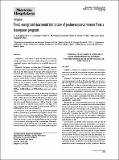Por favor, use este identificador para citar o enlazar a este item:
http://hdl.handle.net/10261/1983COMPARTIR / EXPORTAR:
 SHARE
BASE SHARE
BASE
|
|
| Visualizar otros formatos: MARC | Dublin Core | RDF | ORE | MODS | METS | DIDL | DATACITE | |

| Título: | Food, energy and macronutrient intake of postmenopausal women from a menopause program |
Otros títulos: | Consumo de alimentos, energía y macronutrientes en mujeres postmenopáusicas de un programa de menopausia | Autor: | Schoppen, S. CSIC; Carbajal, A.; Pérez Granados, Ana M. CSIC; Vivas, F.; Vaquero, M. Pilar CSIC ORCID | Palabras clave: | Postmenopausal women Food intake Nutrient intake Anthropometry Physical activity Health-care program |
Fecha de publicación: | abr-2005 | Editor: | Aula Médica Ediciones | Citación: | Nutr. Hosp. 2005, vol. 20, no. 2, pp. 101-109 | Resumen: | Objective: This study aimed to analyse the food, energy and macronutrient intake of a group of postmenopausal women participating in a health-care-program.-- Methods: Subjects included were 38 healthy postmenopausal women aged between 46 and 60 years, recruited from the Menopause Program of the Madrid City Council. Physical activity, some anthropometric data and dietary information was obtained using a modified version of the dietary history method, which contained a 24-hour-recall and a food frequency questionnaire covering the preceding month as reference period. Dietary quality indexes, including those of the energy provided by macronutrients, alcohol and fatty acids and PUFA + MUFA/SFA and PUFA/SFA ratios were calculated.-- Results: This group consumed a diet very similar to the traditional Mediterranean diet. Intake of vegetables (415 ± 165 g/d), fruits (396 ± 178 g/d) and fish (131 ± 69 g/d) was high and a wide variety of these products was consumed. Potato and cereal (157 ± 76 g/d) intake was low. Dairy products, meat, poultry and eggs were only a modest part of this diet. The fat quality (PUFA + MUFA/SFA = 2.26) was satisfactory.-- Conclusion: The diet of this group of postmenopausal women attending a prevention program closely conforms to current nutritional guidelines. Physical activity, body weight and intake of vegetable foods are adequate and may be very useful to counterbalance the increased risk of several pathologies after menopause. However, consumption of carbohydrate rich foods is lower than recommended. Participation in the menopause healthcare-program is useful for weight control and dietary advice. | URI: | http://hdl.handle.net/10261/1983 | ISSN: | 0212-1611 (versión impresa) |
| Aparece en las colecciones: | (IF) Artículos |
Ficheros en este ítem:
| Fichero | Descripción | Tamaño | Formato | |
|---|---|---|---|---|
| Schoppen et al.pdf | 151,83 kB | Adobe PDF |  Visualizar/Abrir |
CORE Recommender
Page view(s)
388
checked on 23-abr-2024
Download(s)
697
checked on 23-abr-2024
Google ScholarTM
Check
NOTA: Los ítems de Digital.CSIC están protegidos por copyright, con todos los derechos reservados, a menos que se indique lo contrario.
